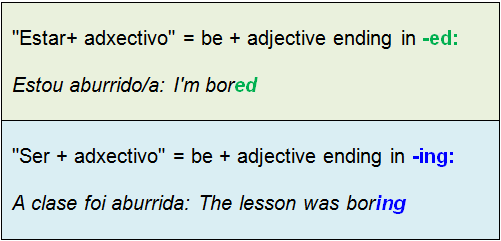GRAMMAR: Adjectives ending in ˂-ed˃ and ˂-ing˃
Read the sentences below and with your partner ask and answer questions 1 and 2.
|
The class was boring and students were very bored The book was fascinating and the reader was really fascinated The film was terrifying and the audience was really terrified |
- What's the difference between the adjectives ending in -ing (boring, fascinating and terrifying) and those ending in -ed (bored, fascinated and terrified)?
- How would you translate "son aburrido/a" and "estou aburrido/a"?
Feedback
1. Adjectives ending in -ing indicate the cause of a feeling, they often describe things and situations. Those ending in -ed indicate how you feel. Compare:
The class was entertaining. Students were very entertained.
This is a worrying problem. I'm worried about it.
2. To remember the meaning and use of -ed and -ing adjectives, translation helps! It's really easy:

Exercise 1. Ending -ed or -ing
Complete the gaps below with -ed or -ing.
Exercise 2
Complete the adjectives below with ending -ed or -ing:
Go to Unit 7.1 to see -ed and -ing adjectives to describe books